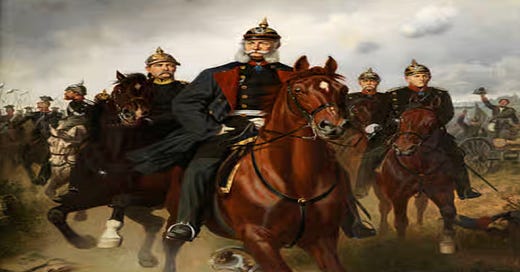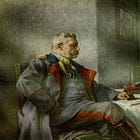This post belongs to a long series. To read the parts that precede it, and those that follow, please use this display link.
Georg Wetzell
Actual War and the Military Commander of the Future
(Continued)
France did not attain this cooperation until the Clemenceau-Foch administration came into power.1 Although David Lloyd George succeeded in stepping up British armament to a tremendous rate of production and in keeping alive the morale of the British nation, he meddled with the conduct of the strategic operations about which he knew nothing. It is true, the modern military commander must collaborate closely with the responsible head of state in the organization of the defense establishment in peace as well as in the employment of the armed forces in war.
Foerster is of the opinion that a 'change in the position of the military commander-in-chief within the state' can be observed in recent times:
While the commander-in-chief alone made all decisions dealing with military operations in the past, he may receive orders to that effect nowadays and will be required to carry them out, even though he may object to them personally for strictly military reasons. I fail to see, however, where military history and modern developments bear out any such conclusions, and I do not think that they are true; on the contrary, I regard them as dangerous. Let us not forget the War Council of Vienna2, Benedek3, MacMahon4, the generals of Gambetta5, the Dardanelles6, and so forth.
Moltke says: 'The military commander is the fate of the nation'. No matter how great a man the head of state may be, success and failure in war depend solely upon the qualifications of the military commander. Only the seasoned soldier, the general staff officer who is thoroughly trained in war or through peacetime study, and who has proven himself in the most varied assignments in peace, can qualify for this position. It will be his responsibility to take care, as Moltke himself once said, 'that politics make no demands which are opposed to the nature of war '.
Bismarck, the great German statesman, almost provoked a serious military mistake, in 1866, by causing Vogel von Falkenstein to march on Frankfurt on the Main, instead of establishing contact with the hostile forces in southern Germany and defeating them. The mistake was averted only by a change in the high command. Again in 1870, Bismarck, despite his eminent military qualifications, caused faulty conceptions to arise regarding the continuation of the military operations after Sedan. Thanks to the King (William I) and his keen appreciation of military situations, these conceptions were finally corrected and the war was continued as proposed by Moltke.
Let us forget neither, as so vividly described in our book on military commanders, that on the site of our opponents statesmen such as Lloyd George and Clemenceau were not above meddling with strategy and talked a sort of 'fireworks strategy' which was more of a hindrance than help to success. The water had risen up to their necks when, in the nick of time, they found Foch.
To be continued …
This post belongs to a long series. To read the parts that precede it, and those that follow, please use the following display link.
The ‘Clemenceau-Foch administration’ ran the French war effort for the last eight months of the First World War (April to November 1918.)
The War Council of Vienna (Hofkriegsrat von Wien) supervised the military operations of the Hapsburg Empire for close to three hundred years (1555-1848).
Ludwig von Benedek commanded the Austrian forces operating in central Europe during the Austro-Prussian War of 1866.
Patrice de MacMahon commanded the French field army that fought against the Germans at Sedan in 1870. Like Benedek, he was often accused of indecision.
After the defeat of the forces led by MacMahon, Léon Gambetta ‘stamped from the ground’ a force of half-a-million men that, when combined with other elements, gave France a large numerical advantage over the invading Germans. Nonetheless, the generals commanding the new armies proved no match for their outnumbered opponents.
The mention of the Dardanelles seems to refer to the lack of enterprise on the part of the commanders of the British Empire forces that landed at Gallipoli in April of 1915.






